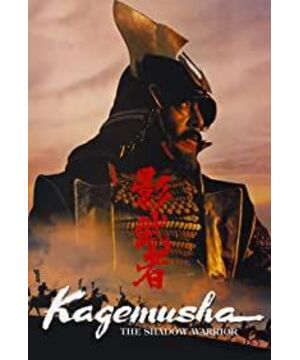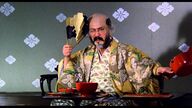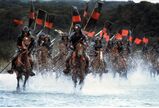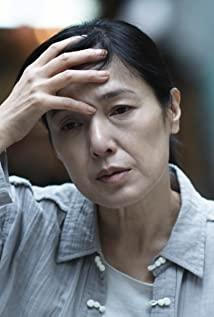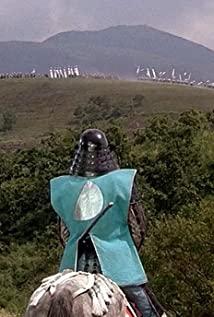Originally published in the DeepFocus WeChat public account
lead
On April 26, 1980, the film "Shadow Warrior" directed by Akira Kurosawa was finally released after numerous ups and downs. Prior to this, two films, "Trolley Maniac" in 1970 and "Dersu Uzala" in 1975 suffered consecutive box office failures, and Akira Kurosawa fell into a ten-year low period, during which he suffered from deep depression. attempted suicide. "Shadow Warrior" finally fought a happy turnaround after its release. In this era when the art of film is gradually declining, he has finally achieved an epic in the true sense with his tenacious will and ambition. The film not only has the emotional power of classical tragedy to shake the soul in form, but also throws the audience a modern philosophical proposition about the relationship between "copy and the original" within its grand epic narrative, which makes the film's brilliance last forever. .
1. Ambition
Takeda Shingen sat firmly in the middle, and two people who looked almost exactly like him sat on the left and right. Akira Kurosawa's opening scene obviously draws on the composition method of classical drama. The dark exposure and simple and stable composition method make this 6-minute long shot, which is rare in film history, full of the depth, solemnity and temporal and spatial continuity unique to the theater stage. This staged form of expression conveys to the audience the concept of "life is like a play, play is like life" from the very beginning. At this time, Xin Xuan was at the peak of his life, and he knew nothing about the death god that was about to descend upon him. The inner ambition led the entire Takeda family towards the victory of unifying the world. Compared with the other two shadowless puppets around him, Akira Kurosawa deliberately painted "True Takeda" with a heavy shadow behind him in terms of light and shadow effects. Takeda's shadow not only shows his status as a powerful character, but also shows in a deeper sense that the core of the entire Takeda family's operation is this entity with a shadow (with spiritual power at the soul level), and other puppets exist around him. Replaceable body.
The narrative starts with a running soldier. We can feel Kurosawa Akira's rhythm in the opening shooting. The soldiers in the large shots are resting, and the static atmosphere of the scene is disturbed by the fast-running signal soldiers. They form an outward expansion force. This dynamic sense of power is very prominent in many of his works throughout his life. For example, in "Spider's Nest City", the cavalry running in confusion in the fog, in order to express the loss and panic, the camera is stable, but the cavalry is seen walking through the fog, the concept and the presentation form are ingeniously combined; For example, in the ending paragraph of "Seven Samurai", the strong wind kept rolling up dust against the ground, and the fronts of the clothes and the flag were shaking wildly, which reflected the hearts of the characters in the plot at that time. His approach is directly derived from the classic literature that he has read a lot, so in his own creation, he has mastered the power of emotion, environment, dynamics and the interaction between these elements.
In the scene where Takeda was attacked, the capital in the quiet night stood there like the materialization of the ideal itself. Although the theme of the overall atmosphere is the word "quiet", the sound when the torch is burning is particularly prominent in the sound effects. In the picture, the city stands tall, and the soldiers are very relaxed with the shakuhachi playing. Victory is within easy reach, as if the war has ended, but the burning torch has become the center of power gathering in the entire scene, making the atmosphere very layered. At the moment when the soldiers and the audience were intoxicated together, the sound of gunfire and the ensuing riot shattered the atmosphere of contemplation that had been established before. There is no line, but the narrative, suspense, and blank space are fully wrapped in one and a half minute paragraphs. Do not break, do not stand, the film rhythm established in the relationship of "standing and breaking", such as the syncopation in the score, is fickle but smooth and natural.
"Death before one's ambition is rewarded", the injured Takeda Shingen died violently on the way home. Before his death, he stretched his arms and still shouted his grand ambition to win the capital and command the world. The blue sky and the snow-white Mount Fuji in the background form a pure conceptual landscape, as if the burning white clouds externalize the passion of life behind death (no wonder the ideal place for suicide is always on the top of a majestic and clear mountain). The reason why the Takeda family has been victorious for many years is that on the one hand, Takeda Shingen himself is extremely talented in all aspects, and on the other hand, his soldiers are united as one, but the helpless withdrawal of troops is like a trick of fate, which makes everyone unwilling. The scene is placed under a setting sun, and the great ambition is filled with depression like dust under the golden light. The victory of this step has passed by, and the unwilling emotions in the discussions of several soldiers are overwhelmed. The magnified brilliance of the setting sun is extraordinarily magnificent - this is the eternal lament of the man who fell with the setting sun.
2. Copy
Akira Kurosawa once said in an interview that "Shadow Warrior" originally started with a flash of inspiration. At that time, he observed that an actor's character and habits were very different in the role he played and his usual state, and then he tried to think about a problem - if a person spends the second half of his life, go all out and keep going all the time to play another role that is completely different from him, what will happen? This idea has been lingering in his mind for many years, and finally formed another core theme of "Shadow Warrior" in addition to expressing the majestic sad song in his heart.
In his writings, Baudrillard talks about a picture in the development of today's society and even in the future - when simulacra and simulated things are typed and copied on a large scale, our lives are completely wrapped in them, thereby simulating Image and simulation completely replace real and original nature, and the world is thus completely simulacrum. Another theme of "Shadow Warrior" can be said to use this story blueprint to conduct a philosophical discussion on simulacrum and simulation, trying to reveal the essential problems of our human beings in the long history.
From the robber being arrested and forced to become a shadow warrior, to the fact that he began to voluntarily identify with this identity and actively cooperate with the operation of the organization, the whole process is described as an inquiry into the meaning of self-existence.
As a robber, the shadow warrior does not even have his own name in the film. This textual skill reflects the unimportance of his self-identity to a specific system. That is to say, its true "natural" self is murdered and becomes a materialized and usable container. On this basis, shadow warriors became possible from the idea. After the thrill of riding horses and whips and responding to all calls quickly disappeared when he played Takeda Shingen at the beginning, the robber's inner self, with the arrival of night, led him like sleepwalking to steal the gold and silver imagined in the large urn of hidden corpses. island. When the candlelight illuminates the urn, the "idol" who remains majestic after death defeats the robber's cognitive system for the whole world. Death and a strong desire for free will are in a closed jar. Face to face, just like Motoko Kusanagi (the alien agent in "Ghost in the Shell") was finally at a loss when faced with countless simulacrums of himself, the stones thrown into the mirror lake rippled on the level of consciousness, leading to the Questions about self-existence - the existence of "I" is naturally determined by the existence of "I" will; To be the "me"? But where does the formation of will come from? Is it possible to change the existence of the original will through simulation to form a new will? These problems overwhelmed the robber, so when he saw the corpse exactly like him, he who was willing to become a shadow warrior could no longer safely accept his fate.
However, the dramatic change appeared after Takeda Shingen's burial. The reason is that Takeda Shingen's charm still affects the world all the time and for a long time at the spiritual level. This is the invasion of the collision of ideas in the world. When the robber lost the opportunity to become a copy and transform himself, the real Takeda passed away, leaving him and many retainers with boundless emptiness and frustration in life. So when he discovered the spy and really realized that the destruction was coming, the black hole-like sense of failure completely took his original "robber personality" out of time, flew back again, completely surrendered and willingly became a substitute.
Later, in the segment where the shadow warriors watched the Noh drama, the performance on the stage and the theme of the film formed an ingenious intertext. Noh actors often wear masks with no expressions on their heads when performing, and their body movements also try to show that kind of rigid puppet feeling. In this kind of drama, the aesthetic taste of actors completely imitating the shape of a puppet has been brought to the extreme in Japan. . The Japanese fascination with dolls can even rise to a metaphysical philosophical concept, that is, the so-called falsity of simulation is closer to the inner source than realism in deep aesthetics. When the characters on the stage wear expressionless Noh masks, and their body movements dance like marionettes, the actor's identity has been dissipated into countless stylized movements. Once the actor's self is emptied, the soul of the character he plays can be attached to it, making the square-inch stage have an infinite historical space. The audience is immersed in it, and does not care about the "contrived" form, but completely forgets the time and space in which it is in reality, and fluctuates with the emotional changes inside the soul-giving doll. This malleability is most likely from the source of ancient drama - witchcraft rituals, with the help of a certain dose of hallucinogens (such as alcohol, poisonous mushrooms, etc.) The ideal spiritual time and space form a united tribal will. To expand, the Takeda family insisted on needing a shadow warrior to replace Takeda Shingen's real body after Takeda's death. Isn't it just a large-scale witchcraft show to maintain the core concept of the entire family?
In this performance, the red tape in the system is the basis for building the stage. In the passage of the robber returning to the house as a shadow warrior for the first time, there is a detail of shooting the underground sweeper repeatedly cleaning the horseshoe marks on the ground, not only to show the strict family style of the Takeda family, but also to highlight the operation mechanism behind the formation of power. In the passages that follow, this outstanding actor finally achieves a deceptive "stage image" after several crises, at least in physical form. After deceiving the closest concubines around him, he slowly walked out of the painting, the shadow behind him covering the whole picture like a dark night. Akira Kurosawa once again used the shadow to convey the mood to the audience, and what he wanted to tell behind was the prophecy that the shadow was about to transform into a more practical existence.
3. Summoning the soul
Dolls, as the most ambitious fantasy in human's grand immersive project, have accompanied us from beginning to end. Since the birth of consciousness, this self-mapping analog form has become the most advanced and complex part of the desire to simulate everything in the universe. Dolls, or man-made copies of natural human existence, the difficulty of realizing it is not a matter of similarity in appearance, but a matter of how to infuse its "soul" (that is, consciousness) that is exactly the same as the real one. The Takeda family's attempt to replace the deceased king with a shadow warrior must also face such a test.
Fortunately, although the king has passed away, his huge spiritual legacy is still inherited by the entire family, and this legacy is passed down through the concept of flying on the flag. "Fast like the wind, Xu Rulin, swept like fire, immobile like a mountain", when several capitalized slogans from "Sun Tzu: Military War" were gradually poured into the heart of the robbers, the shadow warriors really came into being. qualitative transformation. But when another kind of consciousness forcibly invades a carrier, it must be under enormous pressure and torture in the depths of its soul. In the robber's dream, Takeda Shingen's real body jumped up from the big urn and walked towards him like a giant. Like a powerful ideology that knocks the pale and weak self back into shape. This tiny self kept running away in despair, but when Takeda Shingen turned and abandoned him, he turned back to chase, and was finally lost, dazed and depressed in a desolate realm. The artistic conception shown in the dream is very modern, and it can even be said to be a variant of "Waiting for Godot". The loss and reconstruction of this self-will is the original power for people to emerge from chaos.
At the family meeting in the face of the coming war, Akira Kurosawa placed the camera behind the shadow warrior and did not move, and the atmosphere of the vassal, your words and my words, was very warm during the discussion of the complicated situation. In contrast, the shadow warrior sits like a puppet without saying a word. The back image captured by the camera seems to have deliberately chosen a position that attempts to reveal the mysterious mechanism behind the puppet and leaks the internal mechanism of the performance. show it to the audience. However, to everyone's surprise, this fake Takeda did not perform exactly according to the previously arranged script. The questioning that forced him to expose the essence of his body was once again brought into play by this talented shadow warrior through the instilled "soul". When he made the firm decision of "moving like a mountain", everyone blurred their cognition, as if Takeda Shingen was possessed. At this time, the camera position was placed in the center, and the operator behind the puppet retreated. He had already transformed from a copy to the main body in the process of evolution, and began to operate independently.
The "soul" of the Takeda family began in the war, and whether the concept that invaded the inner personality of the shadow warrior like a system virus can successfully replace his original self has to go back to the battlefield to experience the test. The large-scale organized violence of war is fundamentally motivated by the forced implementation or defensive protection of a certain conscious community. It is a large-scale spiritual ritual for human beings to recognize themselves. In this ceremony, the soldiers who died in battle were sacrifices to the idea.
The wars captured by Akira Kurosawa are not obsessed with the sensory pleasure brought to the audience by killing, but rather focus on the realization of a rational conceptual communication within the lens. All you can see is the commander's waving of the flag, and the military generals leading the team running in one direction in the dark, waved again after a while, and another team rushed out. In the dark, the formation of troops on the battlefield and the orderliness in the command are mutually integrated into a general concept - the individual is placed on the stage of war like a marionette, and life and death, success or failure depends on the pulling force behind it. commander. On the other hand, in this big drama of life, who will direct it?
In this war scene, there is a long shot of no one before or after. In this long shot of 2 minutes and 10 seconds, the camera first shoots a barren hilltop from the bottom camera, full of soldiers' bodies and dust swept up by the wind under the setting sun. As a team of men and horses ascended the mountain from the right side of the screen with a banner, the bodies and debris were cleaned up, and then the incantation-like banner of "Fast like the wind, Xu Rulin, swept like fire, and moved like a mountain" was ruthlessly planted on the top of the mountain. On the ground, more people gathered, until the "mountain" flag was played, and a group of cavalry surrounded the shadow warriors standing on the top of the hill to look at the battlefield. The whole scene just ended. Is this "long" paragraph that seems to be completely contrary to the normal viewing rhythm, is it a technical error caused by a failure? I am afraid that such a judgment is too frivolous and ignorant. A continuous and complete flow of time and space intended to convey a naked, unedited concept. The landscape concept presented by this image can be translated into written language so that readers can easily discover its allegorical properties. This allegory is about how the so-called civilization, ideas and people of faith, came to the fore in a barren void. On the other hand, this world is originally "a strong wind blowing through the barren mountains" with nothing, because there is a certain concept that a team of people believes in, and the concept of the so-called "human" existence was born.
When the idea of existence flutters in the gale like a flag fluttering on the top of the mountain, protecting the lord is protecting the survival idea of the Takeda family, and sacrificing one's life under the banner to protect the lord is the ideal state of the sacrifice of the individual self as a family idea as a whole. . Therefore, when the shadow warrior witnessed the replacement of himself by the idea, and witnessed the sacrifices made by countless retainers around him, he completely understood that he was no longer the original self, but the embodiment of an idea! As the tragic music sounded, when the shadow warrior faced the last rushing to the front of the Tadashi Honda and firmly shouted the order of "do not move like a mountain", the original lord possessed him and manifested his spirit, the god-like majesty was enough to drink Retreat the monsters who want to attack. In the dark, the flag is facing the wind and the wind is fierce, and the soul-calling ceremony uses blood to sacrifice a temporary living space between the sky, the earth, and the people.
4. Elegy
The heavy rain curtain fell, and the air seemed to be washed away by the rain, and the people who were in it were confused and couldn't help themselves. No matter how realistic the replica's simulation of the real copy was, it could not be completely replaced, and it fell short in a small mistake. In Katsurai's disgust for shadow warriors and his rebellion against his father again and again, the Takeda family's qi was finally exhausted.
Shenglai, who was approaching in the heavy rain, was full of confidence, and the people around him held umbrellas for him and waited on him carefully. In the same shot, the shadow warrior who passed by him was soaked and shrinking, and a few thug-like figures surrounded him and drove him away. Shenglai didn't even bother to look at the actor who played his father. This fake Takeda's expulsion scene is so movingly arranged that when it comes (Katsurai enters the house) and goes away (the shadow warrior is expelled), it seems that the fake is preserved (the fake Takeda is exposed and left, and the real successor Katsurai ascends the throne and enters the house), but in fact From ideas to emotions, they are accusing mediocrity of shortsightedness and stupidity. The Takeda family personally expelled the shadow warriors who represented the soul of their core family and had been trained and formed, but welcomed a so-called "true son" who was full of prejudice and even hated his father. His fate was destined to decline. Howl can't be undone.
During the subsequent funerals, the rash dispatch of troops, the omen of the sky, and the annihilation of thousands of troops, the Shadow Warrior retreated to the edge of the stage and became a spectator of history. Although there are thousands in his chest, he can't speak, only Yuan stares in amazement and fear, witnessing the end of a great era that once belonged to the Takeda family.
It's a clear blue sky again, and it's another life and death. Like the death of Takeda Shingen, the white clouds hovered high above, as if God had chosen the right day. The commander-in-chief of the three armies of Wind, Fire, and Lin stood on horseback on the slaughterhouse that was about to begin to die, chanted the last goodbye, raised the spears in his hands high and overlapped, and swore an oath against the sun for the last time! The upward shot puts the characters in the background of the blue sky and white clouds. This pre-war parting burns the whole emotion, fluttering in the autumn sky as pure and blue as the ocean, that kind of familiar Japanese special film. The heroic lyricism that can only be seen in China is actually placed before the complete destruction, and there is a strong Homeric epic heroism and romantic tragedy.
As line after line of charging cavalry fell under the volley of Oda Nobunaga's muskets, death showed its most horrific cannibalism and chewed up the loser. In slow motion, the dying life constantly magnifies the insignificance and pain of the people at the boundary between life and death. Shadow warriors who were originally watching the battle or could save their lives suddenly rushed into the battlefield like crazy, raised their spears and rushed towards the enemy camp. Yes, after the ups and downs of this life, he is no longer the original robber. At this time, he has long since merged with the Takeda family, or he has become the new Takeda Shingen. Whether it is used or expelled, He already has a heart of Takeda Shingen and a soul of Takeda Shingen. The shadow warrior at this time is Takeda Shingen himself, or he is the incarnation of Akira Kurosawa's self after experiencing Japanese movies for more than half a century and being shaken by the changes.
After the platoon of guns rang, the command chair was empty, only the wind was blowing sand and dust to send the shame of failure to the cowards who had already fled.
"Takeda Shingen" was blood red as if it was burning. He plunged into the cold blue water and looked at the submerged flag of "Fast like the wind, Xu Rulin, swept like fire, motionless like a mountain". In the strong color contrast of red and blue, he tried to grab it but was suddenly caught in the throat by the hand of death and fell to the ground. The theme music sounded again, and the melody was like the rising and falling of the sun, like the waves of the sea, and the body of "Takeda Shingen" missed the flag in the ocean current...
Going back to the beginning of the film - the "stage" is dark and empty, and the bodies with "ideas" are so similar in appearance, they discuss, argue, and break up... Sometimes true and false, inaction is there and there is nothing.” This is probably the case in history and life.
Text: Asphalt
2018.09.10
View more about Kagemusha reviews


